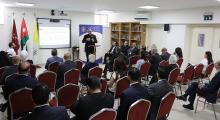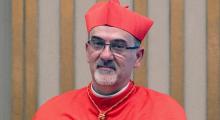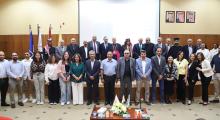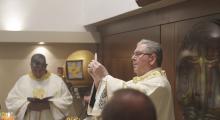Issued by the Catholic Center for Studies and Media - Jordan. Editor-in-chief Fr. Rif'at Bader - موقع أبونا abouna.org

Following is the text of the meditation by Latin Patriarch of Jerusalem His Beatitude Pierbattista Pizzaballa for the 14th Sunday of Ordinary Time, Year C , July 3, 2022:
The Gospel of Luke is the only one to recount two times the sending of the disciples on mission. The first time, at the beginning of chapter 9, concerns the Twelve and is reserved to the people of Israel. The second, which we read today and is found in Chapter 10, extends to a more significant number, to the 72 disciples, and is intended for everyone, even the heathens.
It is especially important for the evangelist to affirm that the life of the disciple is to participate in the same mission of Jesus. Jesus is the One sent by the Father to bring all men to encounter Him, to a life as children; and whoever accepts salvation, in turn, sets off on the way behind Him, to infect others with the same experience of life: it’s not something arbitrary, it’s not optional; it’s essential. The Christian message, if kept for itself, dies.
In sending His disciples, Jesus doesn’t make plans; He doesn’t teach strategies. He doesn’t plan the way. He instructs in a style, and it’s a style that has all the flavor of the newness of the Gospel. Therefore, He doesn’t make plans but ‘throws’ His disciples into life, He sends them to homes and squares, where humans live. He asks them to eat with the people, take care of their sick, and participate in their suffering.
The Christian message is not an idea, but it needs a home, a city, where to enter and shape life.
We find this paradoxical style again in some of the expressions in Jesus’ exhortation to His missionaries.
“I send you as lambs among wolves” (Luke 10:3). The mission “program” is a Paschal program because it will undoubtedly have to shoulder the evil present in the reality that they encounter. The Lord does not send His disciples to take a walk, to speak about interesting things that will be received with ease and availability. He does not promise easy results; He doesn’t mislead anyone. The Lord sends His disciples to go into the death of the world, to announce that right there – by grace – salvation takes place. And this message will undoubtedly accept obstacles and rejections, as happened with Jesus Himself.
Still, Jesus sends them, knowing that setting off means giving life; and asks it to be done in the style of the meek lamb because only this attitude of meekness can overcome evil. Not by force, not by power, not by one’s own means, but by the humble witness of love.
“Carry no money belt, no bag, no sandals” (Luke 10:4).
When one goes on a journey, one tries to provide for and take everything that’s needed. Jesus does the opposite and asks them not to bring anything. Why?
The success of the mission will not depend on means or equipment, but on the humble testimony of life that proclaims a God who has become poor and sympathetic.
The disciples set out poor because they know they need each other, they are able to create room within themselves, the know above all how to ask. Loving others is not just to give them something, but also to need them.
They set off poor because that they can trust the One who sent them and those who will welcome them.
Missionaries are not people who have everything, who know everything, who think they have everything others need. They leave humble, because only if they have learned to need can they really meet the other: therefore, they will let themselves be evangelized first, and precisely by the people they meet.
“Do not stop to greet anyone on the road” (Luke 10: 4). This is also very strange. The reference is to an event of the Old Testament (2 Kings 4.29), in which the prophet Elisha sends his servant Giezi to revive the son of the Shunammite woman: there was no time to lose, the journey was urgent, he must not get lost in small talk. So, it is as if Jesus were telling His people: look at it is a matter of life and death, you are bringing life to the dead. Do not waste time, because this is the favorable time; it is the hour of salvation.
“If a peaceful person lives there, your peace will rest on him; but if not, it will return to you.” (Luke 10:6). Peace is the great proclamation of Jesus: peace between heaven and earth, between God and men, peace for neighbors and those far away, peace among men to be brothers and sisters once again. It is the peace of the Risen One, the one who conquered death, who reconciled man with God, who freed him from death. And it is a peace that cannot be lost. The apostles are called to give it, but if it is not accepted, the apostle does not lose his peace, which returns to him.
True peace is that of the Risen One, who has already passed through rejection, through death: it is, therefore, a meek peace, and cannot be lost.
“Rejoice rather that your names are written in heaven” (Luke 10:20). The disciples leave, and the Gospel describes them already back, happy for their pastoral results. The Lord does not diminish their joy but interprets it as a sign of the Kingdom that is coming on earth.
And then He doesn’t let His disciples stop at results.
The disciple is a free man: free from pastoral successes, and therefore also from failures.
His true joy is that of one who knows that his life (and also that of all those to whom he has brought the good news) is written in heaven, that is, is kept in God.
+ Pierbattista







